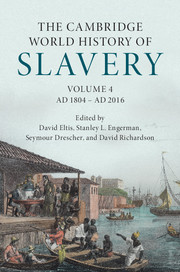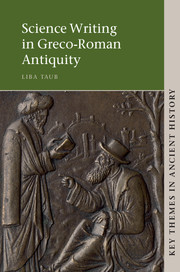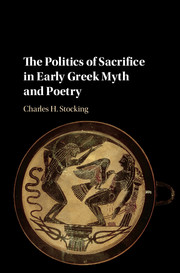Refine search
Actions for selected content:
23989 results in Ancient history
Part IV - Aftermath
-
- Book:
- The Cambridge World History of Slavery
- Published online:
- 20 April 2017
- Print publication:
- 24 April 2017, pp 511-678
-
- Chapter
- Export citation
Three - Assessing Quantitative Change in the Archaeological Record
-
- Book:
- The Collapse of the Mycenaean Economy
- Published online:
- 12 May 2017
- Print publication:
- 24 April 2017, pp 130-159
-
- Chapter
- Export citation
Contributors
-
- Book:
- The Cambridge World History of Slavery
- Published online:
- 20 April 2017
- Print publication:
- 24 April 2017, pp xv-xvi
-
- Chapter
- Export citation
Index
-
- Book:
- The Collapse of the Mycenaean Economy
- Published online:
- 12 May 2017
- Print publication:
- 24 April 2017, pp 345-354
-
- Chapter
- Export citation
Chapter 16 - European Antislavery: From Empires of Slavery to Global Prohibition
- from Part III - Abolition
-
-
- Book:
- The Cambridge World History of Slavery
- Published online:
- 20 April 2017
- Print publication:
- 24 April 2017, pp 373-398
-
- Chapter
- Export citation
Introduction
-
- Book:
- The Collapse of the Mycenaean Economy
- Published online:
- 12 May 2017
- Print publication:
- 24 April 2017, pp 1-30
-
- Chapter
- Export citation
Part I - Overview
-
- Book:
- The Cambridge World History of Slavery
- Published online:
- 20 April 2017
- Print publication:
- 24 April 2017, pp 1-70
-
- Chapter
- Export citation
Figures
-
- Book:
- The Cambridge World History of Slavery
- Published online:
- 20 April 2017
- Print publication:
- 24 April 2017, pp xi-xii
-
- Chapter
- Export citation
Chapter 18 - The Emancipation of the Serfs in Europe
- from Part III - Abolition
-
-
- Book:
- The Cambridge World History of Slavery
- Published online:
- 20 April 2017
- Print publication:
- 24 April 2017, pp 422-440
-
- Chapter
- Export citation
Conclusions - Imports and Economy, Crisis and Resilience, Bronze Age and Iron Age
-
- Book:
- The Collapse of the Mycenaean Economy
- Published online:
- 12 May 2017
- Print publication:
- 24 April 2017, pp 275-282
-
- Chapter
- Export citation

The Cambridge World History of Slavery
-
- Published online:
- 20 April 2017
- Print publication:
- 24 April 2017

Science Writing in Greco-Roman Antiquity
-
- Published online:
- 20 April 2017
- Print publication:
- 03 April 2017

The Politics of Sacrifice in Early Greek Myth and Poetry
-
- Published online:
- 13 April 2017
- Print publication:
- 30 March 2017
References
-
- Book:
- The Legend of Seleucus
- Published online:
- 19 May 2017
- Print publication:
- 07 April 2017, pp 351-378
-
- Chapter
- Export citation
2 - Seleucus’ Horseback Flight from Babylon
-
- Book:
- The Legend of Seleucus
- Published online:
- 19 May 2017
- Print publication:
- 07 April 2017, pp 68-98
-
- Chapter
- Export citation
Appendix F - Towards a Legend of Ptolemy
-
- Book:
- The Legend of Seleucus
- Published online:
- 19 May 2017
- Print publication:
- 07 April 2017, pp 346-350
-
- Chapter
- Export citation
Figures
-
- Book:
- The Legend of Seleucus
- Published online:
- 19 May 2017
- Print publication:
- 07 April 2017, pp viii-viii
-
- Chapter
- Export citation
Appendix B - Mullak Onker
-
- Book:
- The Legend of Seleucus
- Published online:
- 19 May 2017
- Print publication:
- 07 April 2017, pp 328-330
-
- Chapter
- Export citation
Maps
-
- Book:
- The Legend of Seleucus
- Published online:
- 19 May 2017
- Print publication:
- 07 April 2017, pp ix-ix
-
- Chapter
- Export citation
Appendix D - Appian’s Seleucus Excursus and Agatharchides of Cnidus’ On Asia: The Goukowsky Hypothesis
-
- Book:
- The Legend of Seleucus
- Published online:
- 19 May 2017
- Print publication:
- 07 April 2017, pp 334-341
-
- Chapter
- Export citation
